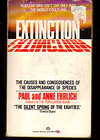Paul R. Ehrlich
Auteur de The Birder's Handbook: A Field Guide to the Natural History of North American Birds
A propos de l'auteur
Paul Ehrlich, founder and first president of the Zero Population Growth organization, was born in Philadelphia, Pennsylvania. He received a B.A. in zoology from the University of Pennsylvania in 1953 and an M.A. and Ph.D. from the University of Kansas in 1955 and 1957, respectively. He became a afficher plus member of the faculty at Stanford University in 1959 and was named Bing Professor of Population Studies in 1976. He is a recipient of a MacArthur Foundation fellowship, and in 1990 he was awarded Sweden's Crafoord Prize, created by the Royal Swedish Academy of Sciences to honor researchers in those disciplines not covered by the Nobel Prize. An expert in population biology, ecology, evolution, and behavior, Ehrlich has published more than 600 articles and scientific papers. He is perhaps best known for his environmental classic The Population Bomb (1968). Paul Ehrlich and his wife Anne began working together shortly after their marriage in 1954. Anne Ehrlich received her B.S. in biology from the University of Kansas. As senior research associate in biology and associate director of the Center for Conservation Biology at Stanford University, she has lectured widely and written on various environmental issues, including the environmental consequences of nuclear war. Together, the Ehrlichs have written six books and dozens of magazine articles. (Bowker Author Biography) afficher moins
Notice de désambiguation :
(eng) This is the author page for Paul R. Ehrlich, the entomologist and population scientist. For Paul Ehrlich (no middle initial), the Nobel Prize winner for Physiology or Medicine, please see this author page. Thank you.
Œuvres de Paul R. Ehrlich
The Birder's Handbook: A Field Guide to the Natural History of North American Birds (1988) 472 exemplaires
Betrayal of Science and Reason: How Anti-Environmental Rhetoric Threatens Our Future (1996) 119 exemplaires
Birds in Jeopardy: The Imperiled and Extinct Birds of the United States and Canada (1992) 41 exemplaires
Humanity on a Tightrope: Thoughts on Empathy, Family, and Big Changes for a Viable Future (2010) 20 exemplaires
A world of wounds : ecologists and the human dilemma 3 exemplaires
A World of Wounds: Ecologists and the Human Dilemma 2 exemplaires
Environmental Security and the Environmental Costs of Preparing for war (Waging Peace series) 2 exemplaires
Die nukleare Nacht. Die langfristigen klimatischen und biologischen Auswirkungen von Atomkriegen (1985) 2 exemplaires
Should we worry about the extinction of other species (The Lindberg Lecture Series in Ecology) 1 exemplaire
China: Back from the Brink 1 exemplaire
United States: Geared to Consumption 1 exemplaire
Brazil: Flight to the Cities 1 exemplaire
India: Life on theE dge 1 exemplaire
Hungary: A Static Society 1 exemplaire
The Butterflies 1 exemplaire
Kenya: A Population Exploding 1 exemplaire
Population, Plenty, and Poverty 1 exemplaire
Insect - Reprinted from the World Book Encyclopedia 1 exemplaire
Befolkningsexplosionen 1 exemplaire
Nan Madol: Spaces on the Reef of Heaven 1 exemplaire
Stork And The Plow 1 exemplaire
Teachers Manual. Population Resources Environment. Issues in Human Ecology. 2nd Edition. 1972 Ex-library Edition. 30… (1972) 1 exemplaire
Befolkning, resurser, miljö 2 1 exemplaire
Oeuvres associées
No Room for Man: Population and the Future Through Science-Fiction (1979) — Contributeur — 5 exemplaires
A Better Future for the Planet Earth Vol II: Lectures by the Winners of the Blue Planet Prize (1997-2001) (2002) — Contributeur — 3 exemplaires
Principles of Green Bioethics: Sustainability in Health Care (2019) — Avant-propos, quelques éditions — 1 exemplaire
Étiqueté
Partage des connaissances
- Nom canonique
- Ehrlich, Paul R.
- Nom légal
- Ehrlich, Paul Ralph
- Date de naissance
- 1932-05-29
- Sexe
- male
- Nationalité
- USA
- Lieu de naissance
- Philadelphia, Pennsylvania, USA
- Lieux de résidence
- Philadelphia, Pennsylvania, USA
Stanford, California, USA - Études
- University of Kansas (PhD | 1957)
University of Pennsylvania (BA | 1953)
University of Kansas (MA | 1955) - Professions
- entomologist
demographer
ecologist
lepidopterist
birder - Relations
- Ehrlich, Anne H (wife)
- Organisations
- Stanford University, Department of Biological Sciences (Bing Professor of Population Studies)
- Prix et distinctions
- Crafoord Prize (1990)
Ramon Margalef Prize in Ecology (2009)
Fellow of the Royal Society (2012)
American Academy of Arts and Sciences (Fellow)
American Association for the Advancement of Science (Fellow) - Notice de désambigüisation
- This is the author page for Paul R. Ehrlich, the entomologist and population scientist. For Paul Ehrlich (no middle initial), the Nobel Prize winner for Physiology or Medicine, please see this author page. Thank you.
Membres
Critiques
Listes
Prix et récompenses
Vous aimerez peut-être aussi
Auteurs associés
Statistiques
- Œuvres
- 60
- Aussi par
- 10
- Membres
- 2,619
- Popularité
- #9,801
- Évaluation
- 3.6
- Critiques
- 26
- ISBN
- 122
- Langues
- 7

















